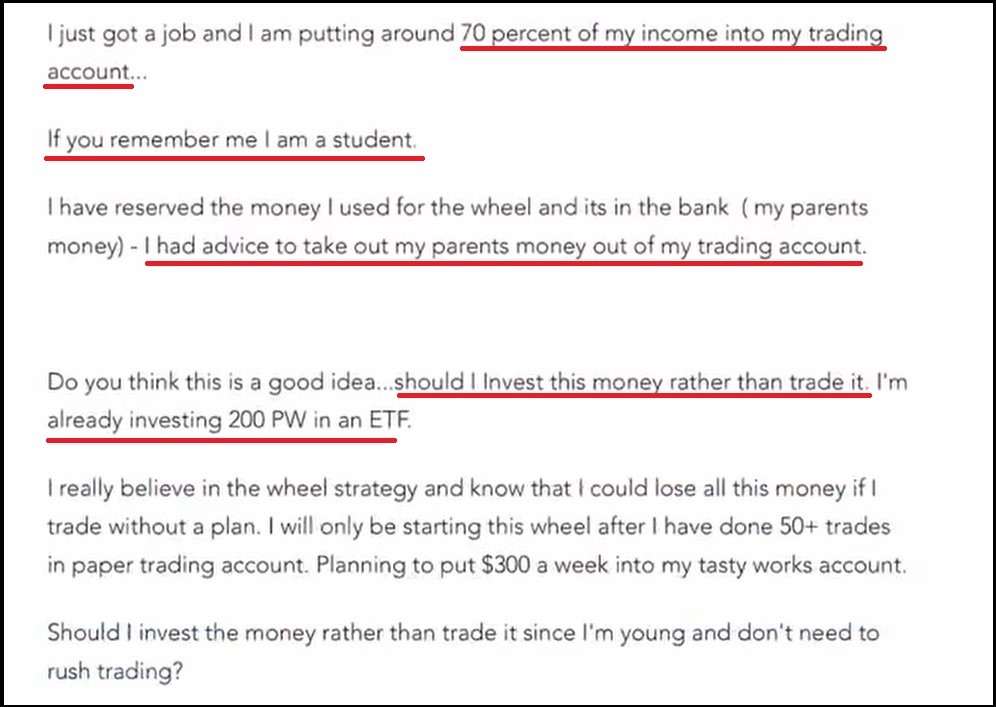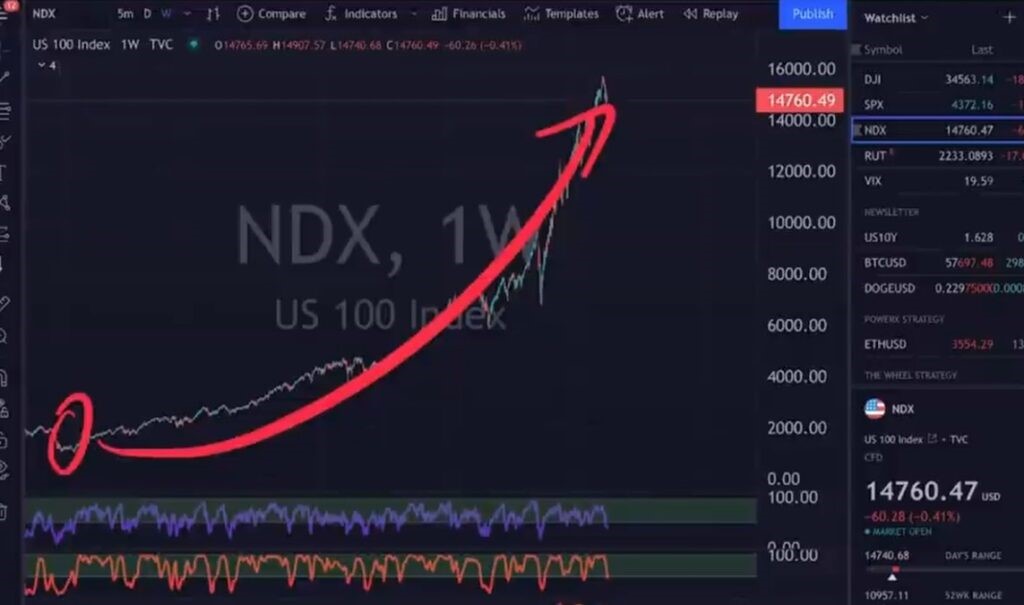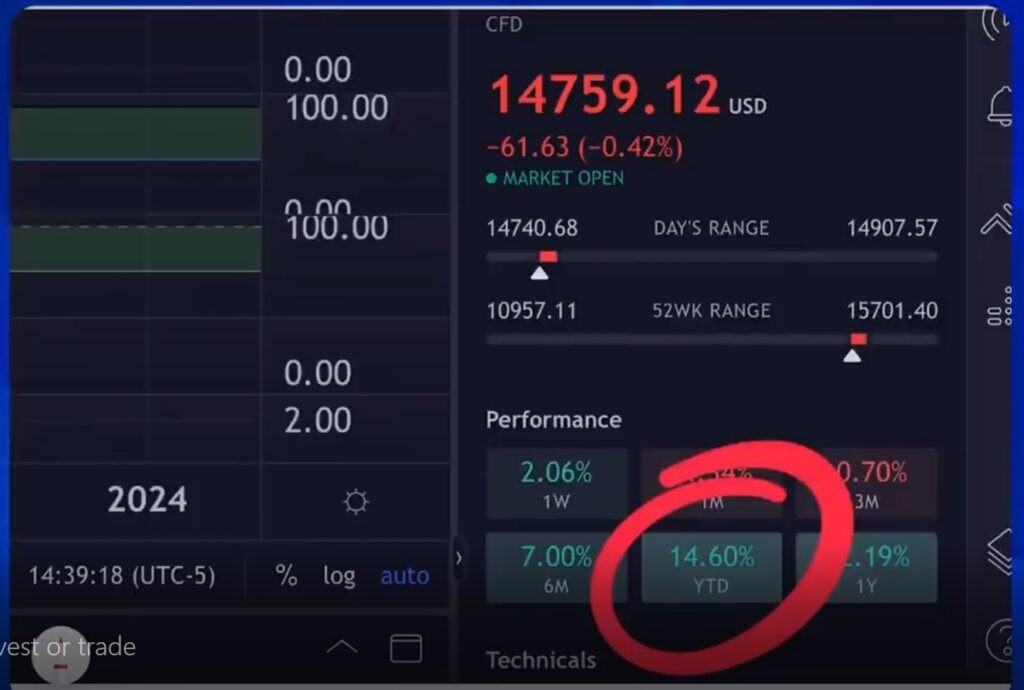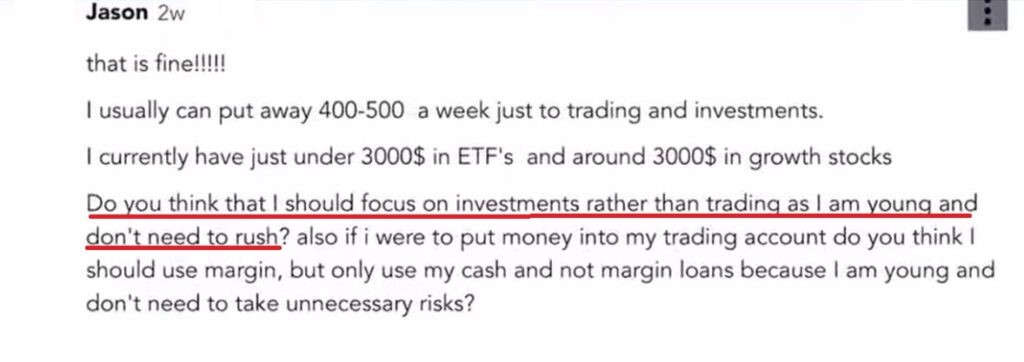Quick story here. A few months ago, I talked about a younger trader named Jason. Jason is in college, and has saved $20,000. He also received some money from his parents, which he used to trade, recalls, Markus Heitkoetter of Rockwell Trading.
This is when his parents found out and told him, “You should stop trading and focus on college.” So, he asked us for advice on what he should do.
Should Jason Invest or Trade?
Jason just sent us another message a couple of days ago, and I want to show you what the message said. I think this is really cool to talk about, because it’s a question that comes up very, very often.

Jason said, okay, “I just got a job and I’m putting around 70 percent of my income into my trading account. If you remember, I’m a student.”
Okay, good. He’s also reserved some money for trading The Wheel Strategy. It’s one of the strategies that we like to trade.
So, should he take the money that he can save and put it into a trading account? Or should he invest in an index ETF and let it grow? Right now, index ETFs have been doing great over the past 10-12 years, so let’s talk about this.
Mark Hodge: It’s a great question. First of all, I have to say, I commend Jason for putting that much of his paycheck away at such a young age. I wish I did it.
I dabbled with stocks back then and was trading stocks at his age, but I really didn’t have a sophisticated approach or strategy.
It was back when you had tech stocks just going crazy. So, kind of akin to what Bitcoin has been doing the last couple of years. That’s where I got really interested in stocks, but I didn’t have a solid strategy.
I really didn’t know anything about the markets, I pretended I did. But just saving that amount of money is doing an awesome job. He’s on the right track. The next step is, what’s the best thing for you to do now?
Markus Heitkoetter: Also, Jason says he will only be starting The Wheel after he’s done 50+ trades in a simulated account.
As you can see, Jason is ready for the markets, and this is what we talked about in the previous video. We had five criteria that I ran through:
- His account size. Is his account size sufficient to trade The Wheel? And yes, it is.
- Does he have a solid trading strategy? Yes.
- Does he have trading discipline? Another yes.
- Does he have realistic trading goals? Yes, they are very realistic, and he has a solid plan.
And number five. I wanted to clarify with him and ask how much money could be put away each week, to which he said $500. Good for him for not living a typical college kid’s life by blowing this money on stupid stuff, but by thinking about investing and trading.
The Plan
Okay, so let’s take a look at a weekly chart of, for example, the Nasdaq.

We see if we go back to 2010, 2009, it seems to be a smart idea to invest in an index fund.
However, what can we expect with an index fund? I mean, usually we can expect around 12% to 18% per year.

Let’s take a look at this year, at where we stand thus far. Now we’re looking at the Nasdaq and, year to date, we’re up 14.6%, which is not bad.
September was a little bit rocky. October was a little bit rocky. We might have a Santa Claus rally, we might have correction, but I think the 12% to 18% are very reasonable.
Sounds like a solid trading strategy. Even the with the S&P 500 up 16%, and the Dow up 13%. So that’s good.
But what are your thoughts, Mark? Because one of the questions that he has—and this is where I want to touch on—is this:

“Do you think I should focus on investments, rather than trading, as I am young and don’t need to rush?”
I think it’s the opposite, let’s talk about this.
Mark Hodge: I agree. I mean, this is where he has time on his side. He has the ability to be a little more aggressive.
You know, a lot of times when you first get a job, at least in the US, where it’s a decent job with a 401k, and you get to pick from conservative, to medium aggressive, to aggressive.
On the aggressive side, you’ve got 12%, right? And you’re allocating this money depending on how much time you have.
I think with time, you have the ability to be wrong and to be a little more aggressive to get those bigger returns, because you have a lot of time on your side.
Markus Heitkoetter: Right. He is able to put away $500 per week, which is $2,000 per month, which is in addition to the $20,000 that he already has in his account.
Just think about it, let’s say things are going horribly wrong, and he would lose all the money that he’s putting away right now. He’s between 20-22 years old, maybe. He has so much time to make more money if he loses it.
Once he’s done with college and gets a real job, where he can maybe save even more, he could absolutely start over.
But right now, he has this opportunity to get a head start. As you know, with The Wheel, if you’re not using a margin account, you can expect 30%. Especially when you’re trading it conservatively, as you want to do it.
And if you’re using a margin account, you could make 60%.
This is what I really like about Jason. He has a three-year goal, and I love it. Some people only have a short-term goal and think, "Oh okay, I’ll put this all on AMC, or GME, and to the moon."
Don’t think like this. You want to grow your account at a realisic rate, with a very, very solid plan.
I do believe that there’s a very good chance that Jason can achieve his goal, especially if he puts more money into this trading account.
Mark Hodge: And that’s the thing. When you’re at a younger age, small, consistent returns can be a little bit boring.
When you’re at a younger age, you might think, “Oh, if I have $5,000 and I make $1,000, that would be boring.” Or “If I make $1,500 that would be boring” because we see these AMC swings or GMC’s swings, but these just aren’t repeatable.
But, if you’re consistently getting those returns and you’re a little bit aggressive, the thing about The Wheel is…I believe you can outperform an index with a little management, and you can navigate the markets better.
You could choose to just be all cash if things get tricky, and so you can avoid the dip that you might experience in a fund.
But you can also bring in more income and just bottom line outperform, while also having a buffer, right?
Because when you’re selling puts 5-10% below the market, you’re basically accommodating a dip, which you wouldn’t be able to do by just buying a fund.
Markus Heitkoetter: Here’s the most important thing, when it comes to trading, you should never trade with money that you can’t afford to lose.
If Jason were to ask himself, if everything would go horribly wrong and he lost this money, can he still pay for lunch? Yes, because he has a job and he’s not dependent on this money.
Summary
I believe the way he should approach trading is to accept that there’s a good chance his account will grow. But, we never know when it comes to the markets. There could be a few trades that could wipe out his account.
If this happens, I believe it won’t change the lifestyle that he has right now. And this is very, very important.
Often, I ask married couples if their spouse would be okay if they lost this money. If they would be super upset and leave you, then you probably shouldn’t be trading with that money.
In Jason’s case, I absolutely think that at this point in his life, with the way he’s been approaching trading, it might be better to trade the money instead of investing it.
Mark Hodge: I absolutely agree. I also think if you go in and say, “Hey, this is money I can afford to lose,” if you’re trading The Wheel Strategy and you put on 50 paper trades, worst-case scenario, it might be like a 25% dip.
Or even if things got really ugly and it was 50%, I don’t think it’s going to be 100. But if you have that mindset going in, and you have the potential to generate these great returns and compound it, you’ll be far better off.
Markus Heitkoetter: Long story short, since you asked, I believe if he’s investing it into an index fund right now, he’s being way too conservative. He has many, many, many more years ahead of him. You can be conservative later in your life.
At this point, with the way that Jason is approaching trading, I would say trade it. I hope that this discussion helps everyone to understand why sometimes we say it makes sense that you trade this money, and sometimes it might make sense for you to invest this money.
Learn more about Markus Heitkoetter at Rockwell Trading.











